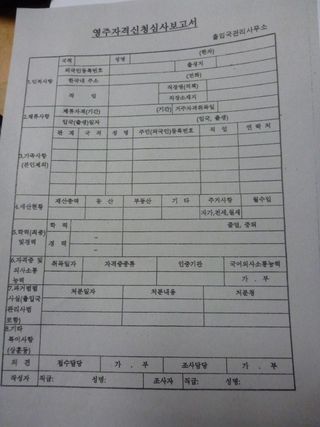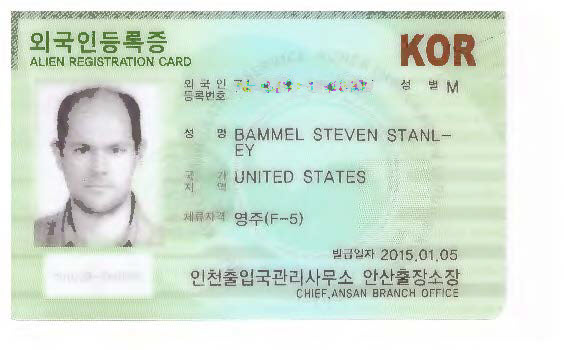I had previously looked into getting an F-5 visa through the points system, but though I had enough points, I was on a student visa at the time, and there is no way to transition from that to an F-5. However, I’ve been on an F-6 (Spouse Visa) for a few years now and recently applied for an F-5.
I found the information available online and at Immigration to be adequate, but minimal and a little confusing. I hope my explanation of the requirements is somewhat more complete and helpful (at least for American citizens going to the F-5 from an F-6).
To be eligible for the F-5, I had to be in Korea for two years on the F-6 first (it didn’t matter that I’ve been in and out of Korea for much longer than that before) and any time I spent out of the country (such as back in the States selling our house in 2012) did not count toward the two years.
Here’s what I was responsible to have in-hand when applying at Immigration.
1. Police report from my home country (해외범죄경력 증명)
In my case, this took the form of a Criminal History Summary Check through the FBI (unfortunately the US Embassy in Korea provides no help at all in this matter). I found various information online about applying for this through a “channeler” or through a local office in my state, and even the online information about going through the FBI was confusing and made me concerned that the FBI wouldn’t fulfill my request or that the document issued by them would not be usable for the visa application. But I took a gamble and went ahead and applied based on the information at the following link:
- [EXPIRED LINK REMOVED: https://www.fbi.gov/about-us/cjis/criminal-history-summary-checks/submitting-a-criminal-history-summary-request-to-the-fbi]
To do so, I downloaded the standard fingerprint form (FD-258) at [EXPIRED LINK REMOVED: https://www.fbi.gov/about-us/cjis/criminal-history-summary-checks/standard-fingerprint-form-fd-258] and took it down to my local police station. A detective on duty was happy to take my fingerprints.
I then mailed that with my application and credit card payment details (see link above for instructions) to the address shown and waited about a month to get it back.
Unfortunately, Immigration wouldn’t accept this; it needed to be certified with an apostille (another service that the US Embassy doesn’t provide). To get this, I had to send the certificate to the US Department of State in Washington, DC to request authentication. For details on that, I followed the instructions at this link:
- [EXPIRED LINK REMOVED: https://www.state.gov/authentications/c60222.htm]
The instructions include a requirement to provide a self-addressed prepaid envelope, but being in Korea, I didn’t have access to US postage for the return. So, I prepared everything without the postage and sent it to my father in the US, asked him to get the postage (for both the outside envelope and return envelope) and forward on the documents to the US Department of State. Another month later, I received my authenticated criminal background check back, ready to submit.
The problem with this process is not just that there are so many points along the way where something can go wrong, but Korean Immigration will only recognize documents under three months old. That means, once you get your criminal background check in the mail, don’t wait to send it in for authentication. And after getting the authentication, don’t wait to take it down to Immigration and apply. I slid in just a week under the three-month deadline since I had not moved as quickly I should have to apply for the apostille.
I was told the first time I asked that I didn’t need to get the criminal background check translated. However, when I showed up with the final application, a different person was at the desk. She told me it had to be translated into Korean. She also said I could do it myself and that I didn’t need to hire someone else (which was nice!). She was even prepared to accept a hand-written translation, though I took it to the office and typed it up nicely there. Finally, upon submitting the translation, she gave me a certificate to sign saying that I’d translated it accurately.
2. Original AND photocopies of US passport and US driver’s license
I might have only needed one of these documents, but I took both just to be safe.
3. W200,000 in revenue stamps
Apparently the cost used to be W70,000 but went up just this year. The revenue stamps (수입인지) can be purchased directly at the Immigration Office.
4. A filled out Permanent Resident Eligibility Application Review Report (영주자격신청심사보고서)
It looks like the following and can be picked up at the Immigration Office.

5. A filled out application form (통합신청서)
This is the main application filled out for all types of visa applications and is available at the Immigration Office, too.
6. One color photograph
This must have been taken within the previous three months (though who’s really checking?). The instructions say it’s supposed to be 반명함 (half business-card) size, but Immigration rejected the photo I took, saying it was too small. When I took it back to the photographer, he insisted he’d given me the right one the first time. I still got my photo printed again, though, this time bigger (3.5cm x 4.5cm), and it turned out that this is what Immigration wanted.
7. Official copies of whatever family documents my local government office (동사무소) could provide for my wife, my kids and me, including 주민등록표, 기본증명서, 가족관계증명서, 혼인관계증명서.
I don’t think I needed all that; but why risk leaving something out?
8. Proof of assets
They wanted to see proof that my wife and I have at least W30 million in assets in Korea. For this, I went down to city hall and got registered copies of the titles to our apartment and my office (등기 부등본). I also threw in my business registration (사업자등록증) for good measure, but that got returned to me, so I guess they didn’t need it.
9. Wife and her ID
They would not accept the application without my wife being there too and presenting her ID.
———–
Having submitted all of this at one time, I was issued a document evidencing that my application had been received (체류허가 신청확인서) and the officer told me that they’d contact me within ten months. She said that I would not be contacted before then, so I guess I just wait, though she did say it might be a little less than ten months. When I was in the office asking about things a month ago, the officer at the desk at that time told me it was an eight-month wait, so there’s apparently some flexibility on this.
I can’t say that the above documents and processes will be the same everywhere (things vary mysteriously) or that the requirements won’t change between now and tomorrow. Also, the process for getting the criminal background check will be different for each country, and I got the impression there was a way I could have also gotten an acceptable document through the state rather than the FBI. But at least, the above describes how I did it and it worked, so hopefully this explanation will be helpful to others facing the same challenge.
===================
UPDATE: January 26, 2015
Immigration contacted me early last month to have me bring in current versions of documents proving that my wife and I are still married and that we still own our apartment. About a month after doing that, I got a call on January 6th, telling me I could pick up my new alien registration card on the 20th, which I did. It looks like this:

This means that after about three months of getting my documents in order and submitting them, it then took almost another year to be issued the F-5 visa.



